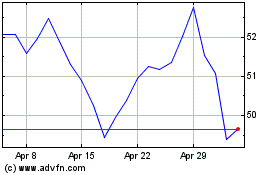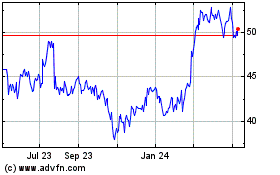Japanese Sales App Soars in IPO -- WSJ
June 20 2018 - 3:02AM
Dow Jones News
By Mayumi Negishi and Takashi Mochizuki
This article is being republished as part of our daily
reproduction of WSJ.com articles that also appeared in the U.S.
print edition of The Wall Street Journal (June 20, 2018).
TOKYO -- Japanese flea-market app Mercari Inc.'s valuation
soared to $6.5 billion on its first day of trading, as investors
celebrated the eBay Inc. rival's debut in a country that is nearly
bereft of influential technology startups.
Shares in Mercari closed up 77% over the offering price after
the company raised Yen130.5 billion ($1.2 billion) through its
initial public offering on the Tokyo Stock Exchange's Mothers
market for startup companies. It was Japan's biggest tech IPO since
messaging app Line Corp. listed in July 2016 and the largest IPO in
Japan this year.
Mercari's app allows people to buy and sell mostly used goods
such as jeans, handbags and games. It has been a hit in its home
market, drawing many young people who have become accustomed to
penny-pinching in the nation's long economic doldrums. Mercari
takes a cut of each sale.
"In an era overflowing with things, there's less premium on
ownership," said Yutaka Suzuki, senior researcher at the
Distribution Economics Institute of Japan. He said young consumers
tend to sell their possessions as soon as they grow tired of
them.
Now Mercari hopes to carve out growth in the U.S. and U.K. with
features that it says differentiate it from rivals. Sellers can
remain anonymous and buyers don't have to pay until they confirm
the item has arrived.
But in the U.S., Mercari's growth has been stymied by bigger
marketplaces such as eBay and Craigslist. Volume remains relatively
low compared with Japan, where delivery in urban areas is fairly
inexpensive and Mercari has tapped a dense network of convenience
stores to help people ship easily.
"In many ways, Japan is another planet," said John Lagerling,
head of Mercari's U.S. operations. The company has negotiated lower
shipment fees from United Parcel Service Inc. and FedEx Corp., and
it is advertising more on YouTube and on the radio, he said. "How
we do in the U.S. and in the U.K. will determine how we do in the
rest of the world."
Mercari logged a net loss of Yen4.2 billion in the 12 months
ended June last year on Yen22 billion in revenue, dragged down by
losses in the U.S.
In Japan, Mercari's growth stems from its easy-to-use mobile
app, which uses its database to automatically complete postings
from just a smartphone photo.
"I can post with just a photo, and neither I nor the seller has
to share an address," said Shingo Fuchigami, a 31-year-old web
producer. He said he began selling when he moved into a home with
less storage and has sold hundreds of dollars' worth of products
such as videogame software after he is done playing with it.
Ease of use helped Mercari get a leg up on Yahoo Japan Corp.,
the nation's top web portal, which has long provided people a
platform to unload used goods. Craigslist and eBay aren't widely
used in Japan.
Investors are betting that secondhand apps like Mercari will
help people around the world deal with closets full of unused
items. Mercari's shares shot up to Yen5,300 on Tuesday, from the
IPO price of Yen3,000, giving the company a market capitalization
of Yen717 billion, or about $6.5 billion.
Startups with valuations of more than $1 billion -- so called
unicorns -- are a rarity in Japan, the world's third-largest
economy, despite easy money from the Bank of Japan, government
subsidies and corporate efforts to incubate ventures.
With the stock-exchange listing of Mercari, only one unicorn
remains in Japan, according to research firm CB Insights. That is
machine-learning developer Preferred Networks Inc., with a
valuation of $2 billion. By comparison, China has 71 unicorns and
the U.S. has 115, according to CB Insights.
Although growing, investment in Japanese ventures came to less
than 2% of the amount venture capitalists and others invested in
startups in the U.S., and less than 3% of the amount Chinese
ventures received last year, according to Venturesource.
Mercari's opening-day performance puts it on par with some of
Japan's best-known names by market capitalization, roughly equaling
Nikon Corp. and convenience-store operator Lawson Inc.
"We want to do away with throwing out things," said Mercari
Chief Executive Shintaro Yamada. "I think we fill a universal
need."
Write to Mayumi Negishi at mayumi.negishi@wsj.com and Takashi
Mochizuki at takashi.mochizuki@wsj.com
(END) Dow Jones Newswires
June 20, 2018 02:47 ET (06:47 GMT)
Copyright (c) 2018 Dow Jones & Company, Inc.
eBay (NASDAQ:EBAY)
Historical Stock Chart
From Dec 2024 to Jan 2025

eBay (NASDAQ:EBAY)
Historical Stock Chart
From Jan 2024 to Jan 2025
